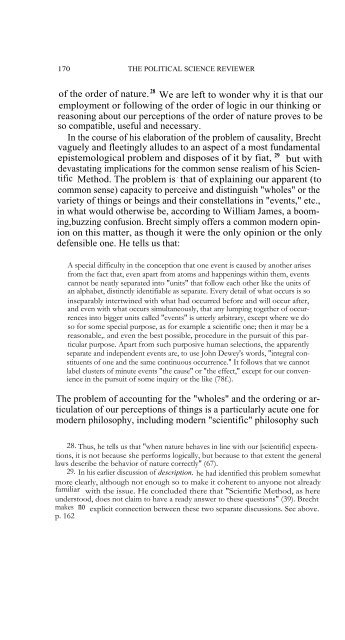ARNOLD BRECHT'S POLITICAL THEORY REVISITED Political ...
ARNOLD BRECHT'S POLITICAL THEORY REVISITED Political ...
ARNOLD BRECHT'S POLITICAL THEORY REVISITED Political ...
You also want an ePaper? Increase the reach of your titles
YUMPU automatically turns print PDFs into web optimized ePapers that Google loves.
170 THE <strong>POLITICAL</strong> SCIENCE REVIEWER<br />
of the order of nature. 28 We are left to wonder why it is that our<br />
employment or following of the order of logic in our thinking or<br />
reasoning about our perceptions of the order of nature proves to be<br />
so compatible, useful and necessary.<br />
In the course of his elaboration of the problem of causality, Brecht<br />
vaguely and fleetingly alludes to an aspect of a most fundamental<br />
epistemological problem and disposes of it by fiat, 29 but with<br />
devastating implications for the common sense realism of his Scientific<br />
Method. The problem is . that of explaining our apparent (to<br />
common sense) capacity to perceive and distinguish "wholes" or the<br />
variety of things or beings and their constellations in "events," etc.,<br />
in what would otherwise be, according to William James, a booming,buzzing<br />
confusion. Brecht simply offers a common modern opinion<br />
on this matter, as though it were the only opinion or the only<br />
defensible one. He tells us that:<br />
A special difficulty in the conception that one event is caused by another arises<br />
from the fact that, even apart from atoms and happenings within them, events<br />
cannot be neatly separated into "units" that follow each other like the units of<br />
an alphabet, distinctly identifiable as separate. Every detail of what occurs is so<br />
inseparably intertwined with what had occurred before and will occur after,<br />
and even with what occurs simultaneously, that any lumping together of occurrences<br />
into bigger units called "events" is utterly arbitrary, except where we do<br />
so for some special purpose, as for example a scientific one; then it may be a<br />
reasonable,. and even the best possible, procedure in the pursuit of this particular<br />
purpose. Apart from such purposive human selections, the apparently<br />
separate and independent events are, to use John Dewey's words, "integral constituents<br />
of one and the same continuous occurrence." It follows that we cannot<br />
label clusters of minute events "the cause" or "the effect," except for our convenience<br />
in the pursuit of some inquiry or the like (78f.).<br />
The problem of accounting for the "wholes" and the ordering or articulation<br />
of our perceptions of things is a particularly acute one for<br />
modern philosophy, including modern "scientific" philosophy such<br />
28. Thus, he tells us that "when nature behaves in line with our [scientific] expectations,<br />
it is not because she performs logically, but because to that extent the general<br />
laws describe the behavior of nature correctly" (67).<br />
29. In his earlier discussion of description, he had identified this problem somewhat<br />
more clearly, although not enough so to make it coherent to anyone not already<br />
familiar with the issue. He concluded there that "Scientific Method, as here<br />
understood, does not claim to have a ready answer to these questions" (39). Brecht<br />
makes no explicit connection between these two separate discussions. See above.<br />
p. 162
















